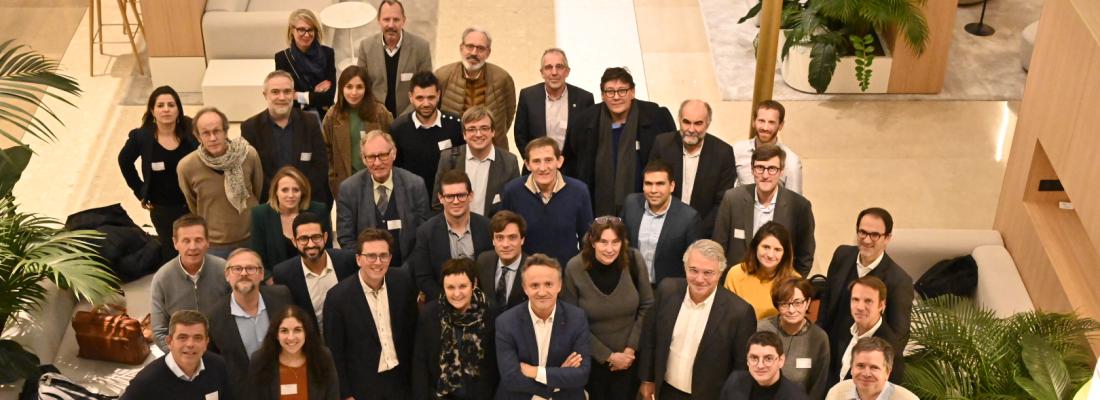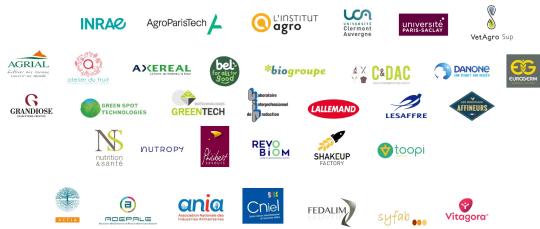Food, Global Health Reading time 4 min
Innovating for tomorrow's food: Launch of the “Ferments of the Future” Grand Challenge
Published on 13 December 2022

Cheese, bread, yoghurt, dry sausage, sauerkraut, kefir, wine... These are just a few of many traditional fermented foods commonly found in diets around the world. The goal of the Grand Challenge is to better understand the mechanisms involved in food fermentation in order to shape them, if necessary, to fit better with health requirements and climate change constraints, or to adapt to consumer expectations. “Ferments of the Future” also aims to encourage the development of new fermented foods, based in particular on cereals, pulses, fruits and vegetables. These new products will help shift diets toward plant-based foods, making them more sustainable.
Three months after its official launch, Monday 12 December marks the operational start of the “Ferments of the Future” Grand Challenge, which aims to mobilise natural fermentation techniques to accelerate the agricultural and food revolution for safer, healthier and more sustainable food.
- Safer because fermentation is a natural process that helps preserve food better, thereby limiting the need for additives.
- Healthier since fermentation produces nutrients of interest such as vitamins, improves gut microbiota, and optimises the sensory qualities of food while reducing its sugar and salt content.
- More sustainable because fermentation is a solution for adapting to variations in raw materials due to climate change, or for keeping food waste in check.
Focused on food, “Ferments of the Future” may eventually be applied to other domains, especially in the agricultural field.
A unique innovation platform in Europe
Under the impetus of INRAE and ANIA, some thirty public and private partners have joined forces to overcome the scientific and technological hurdles that slow down innovation in fields related to fermentation. These include no less than 6 higher education institutions and research bodies, including 7 research units specialised in microbiology, food processing and data science; 21 companies, including 8 start-ups, 7 SMEs and mid-sized businesses, and 6 large groups; and 7 associate members (trade unions, inter-professional organisations, technical institutes and competitive clusters). This wide range of actors, brought together in a single decision-making body, a Strategic Steering Committee, will steer the programme and contribute to operations and financial functioning.
The programme will thus rely on the excellence of French research teams in the “Ferments of the Future” fields, both nationally and via regional clusters, and on an innovation platform for more mature projects that will be set up on the Saclay campus from late-2023.
Stepping up the pace to tackle major scientific and technological challenges
The aim is to answer fundamental questions for innovation in the field of ferments and fermented foods. For example: How can ferments adapted to plant-based foods be developed? What technologies are needed to monitor microbial dynamics in fermentation processes in real time? How can the contribution of fermented foods in the maturation of the intestinal microbiota in infants be measured? What does AI have to offer when it comes to developing new combinations of ferments?
These questions, among others, may give rise to research projects within the framework of calls for projects, with an annual budget of €1.5 million, the first of which will be launched in early 2023 in order to select 5 to 7 pre-competitive projects targeting strategic priorities. The first pre-competitive results of the “Ferments of the Future” Grand Challenge are expected by the end of 2024.
"Fermented foods and beverages are already a major part of our diet. By exploring the tremendous innovative potential of ferments, we will not only develop new foods based on plants, cereals, pulses, milks or fruits, but also make better use of products that are currently considered as waste! This programme therefore aims to make a very concrete contribution to the transition towards healthy, safe and sustainable food for future generations.”
Damien Paineau, Executive Director of “Ferments of the Future”.
34 public-private partners already involved in the programme
6 public members: INRAE, AgroParisTech, Institut Agro, Université Clermont Auvergne, Université Paris-Saclay, VetAgro Sup
21 private members: Agrial, Atelier du Fruit, Axéréal, Bel, Biogroupe, C&DAC, Danone, Eurogerm, Grandiose, Green Spot Technologies, Greentech, Lallemand, Les Nouveaux Affineurs, Lesaffre, LIP, Nutrition & Santé Nutropy, Revobiom, Philibert Savours, ShakeUpFactory, Toopi; i.e. 8 start-ups, 7 SMEs and mid-sized businesses, and 6 very large companies.
7 associate members: ACTIA, ADEPALE, ANIA, CNIEL, FEDALIM, SYFAB, Vitagora

